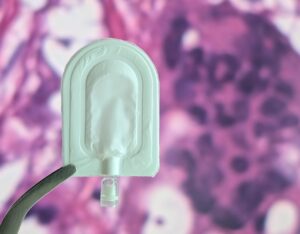
A focus of JDRF’s Improving Lives research is to improve glucose control and reduce the burden of self-management by advancing the development of new drugs and devices for people with type 1 diabetes (T1D).
The study: Can adding an approved glucose-lowering drug to treatment with a closed-loop insulin delivery system improve glucose control in T1D?
A JDRF funded collaborative team out of Mount Sinai Hospital and McGill University recently published findings in Nature Medicine about how an add-on treatment to insulin could improve glucose control in adults living with T1D. Empagliflozin is an already approved medication that is used to improve blood glucose levels in people living with type 2 diabetes.
Dr. Bruce Perkins and Dr. Ahmad Haidar, alongside their teams at the Research Institute of the McGill University Health Centre and the Lunenfeld-Tanenbaum Research Institute in Toronto, examined the individual and combined efficacy of the SGLT2 inhibitor empagliflozin – an oral drug that acts on the kidney to rid the body of excess glucose – on the time spent in the glucose target range (3.9-10.0mmol/L) over a 4-week period in people living with T1D. Participants in the study took empagliflozin while using either a closed-loop system or a sensor-augmented insulin pump. The study was placebo-controlled, meaning that some participants did not receive the drug and no participants knew which one they were being administered.
What did the study find?
Empagliflozin improved the time in range whether participants were using the closed-loop system (by 7.2%) or the sensor-augmented insulin pump (11.4%), and also decreased daily insulin doses. Compared with participants who used an insulin pump alone, participants who used a closed loop system plus empagliflozin spent 17.5% more time in range each day (i.e., over 4 hours). As per international consensus guidelines, an increase of the glucose target range of more than 5% is considered clinically meaningful. Since empagliflozin can increase the risk of ketoacidosis in people with T1D, the team also closely monitored daily ketone levels. Although ketone levels were higher in some participants, the researchers observed no episode of diabetic ketoacidosis (a hyperglycemic episode that requires immediate medical attention) with empagliflozin in this study. There were also no episodes of severe hypoglycemia.
What does this mean for people with T1D?
The addition of adjunct therapy to T1D management and especially closed-loop systems holds a lot of promise. Drugs like empagliflozin may also have protective benefits for the heart and the kidneys in people with T1D, and previous studies have shown that the drug can improve HbA1c, weight and blood pressure without increasing hypoglycemia.
What comes next?
Further research is needed with this drug and with other adjunct therapies for people living with T1D –as insulin alone is often not sufficient to help these individuals reach their target blood glucose goals and new therapies offer opportunities to reduce management burden. JDRF will continue to fund the most promising research into drug therapies, and partner with regulators to accelerate approvals, with the aim of driving those that show the greatest promise to market as quickly as possible.



